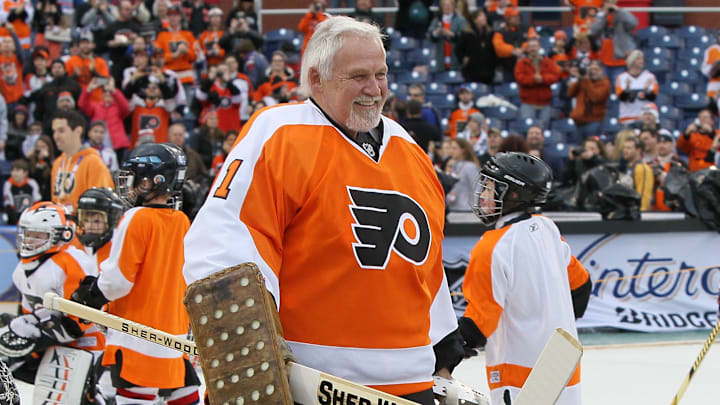On Sunday, the Philadelphia Flyers mourned the passing of a franchise icon. Bernie Parent, the legendary goaltender who played for the "Broad Street Bullies" era of the Flyers, passed away at the age of 80. Former teammate Joe Watson said that Parent passed overnight in his sleep.
Parent will go down as one of the top goaltenders in the franchise's history. After all, he did play a significant role in the team winning two Stanley Cup title in the 1970s before his career came to an abrupt end.
Let's take a look back at Parent's career, spanning across three NHL teams.
Looking back at Bernie Parent's NHL career
Parent didn't initially begin his career with the Flyers. Rather, he began with the Boston Bruins. During the 1965-66 season, Parent recorded a 3.69 goals allowed average, a .898 save percentage, and 12-20-3 record through 39 games. Parent finished fourth in Calder Trophy voting, with the winner being Brit Selby of the Toronto Maple Leafs. The following season, Parent played in just 18 games for the Bruins, where he put up 3.65 goals allowed average, a .891 save percentage, and 4-12-2record.
After the 1966-67 season, Parent ended up on the Flyers for his first official stint as part of the expansion draft. Since joining the Flyers, Parent's numbers improved tremendously. In fact, in his second and third seasons with the Flyers, he made it to the All-Star Game. But during the 1970-71 season, Parent was traded to the Maple Leafs for Bruce Gamble and a first-round pick.
Parent spent two years with the Maple Leafs, reaching the playoffs both years with the team. However, they lost in the Conference Semifinals each year, to the New York Rangers and Bruins, respectively. In his two years with the team, Parent recorded a 2.59 goals allowed average, a .915 save percentage, and a 24-25-1 record.
For the 1972-73 season, Parent played for the Philadelphia Blazers, a World Hockey Association team. The team would remain in Philadelphia for just one season before moving to Vancouver. Parent was around for the first season, recording a 33-28 record and a 3.61 goals allowed average, but then returned to the Flyers, where he took his game to yet another level.
The 1973-74 season was a great one for Parent, as he led the league with 47 wins, a .932 save percentage, a 1.89 goals allowed average, 12 shutouts and 4,307:25 minutes played. Unsurprisingly, Parent won the Vezina Trophy for best goalie, and also finished runner-up for the Hart Trophy for the NHL's Most Valuable Player Award. Once the playoffs rolled around, Parent's strong play continued, recording an incredible .933 save percentage, a 2.02 goals allowed average, and a 12-5-0 record. After the Flyers won the Stanley Cup in six games against the Bruins, Parent was named the Conn Smythe Award winner for playoff MVP.
The following season, Parent once again won the Vezina Trophy after leading the NHL in wins (44), goals allowed average (2.04), and shutouts (12). Parent helped lead the Flyers to their second consecutive Stanley Cup title in 1975 when they defeated the Buffalo Sabres in six games. After recording a 1.89 goals allowed average, a .924 save percentage, and a 10-5 record in the playoffs, Parent won the Conn Smythe Award again.
Parent played four more years with the Flyers, but his career would come to an end after he took a hockey stick to the eye. His vision became affected, and he subsequently retired at just 34 years old. The Flyers quickly retired his No. 1 jersey, meaning that no player can wear that number ever again. In 1984, Parent was inducted into the Hockey Hall of Fame.
Through his 13-year NHL career, Parent held a .915 save percentage, a 2.55 goals allowed average, a 271-198-119 record and 54 shutouts in 608 games.
While Flyers fans remember Parent for his play during the mid-1970s that helped bring the team two Stanley Cup titles, he did go on a journey through multiple teams, including a separate stint with the Flyers.
